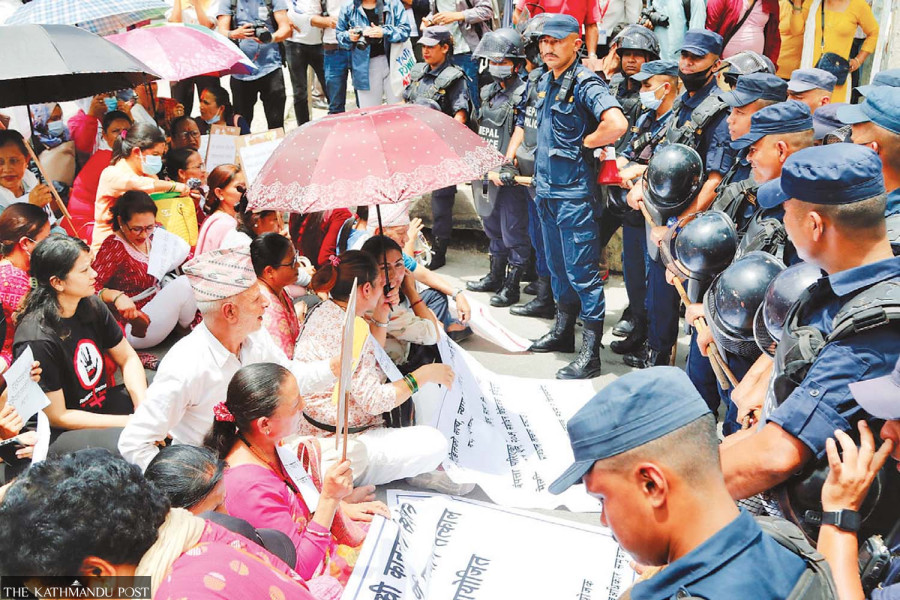National
No consensus on proposed revisions to transitional justice law
After five months of talks, parliamentary subcommittee tosses unresolved issues back to top leaders.
Binod Ghimire
A subcommittee of the Law, Justice and Human Rights Committee of the House of Representatives has failed to find consensus on the bill to amend the Enforced Disappearances Enquiry, Truth and Reconciliation Commission Act despite five months of discussions.
The 11-member sub-panel presented its incomplete report to the committee on Tuesday, after failing to forge consensus on four issues. Following differences among the different parties, the subcommittee has been unable to decide on classifying murder as a serious violation of human rights and non-amnestiable. The present bill lists only ‘cruel murder’ as a serious violation of human rights, drawing criticism from various quarters.
Despite long discussions, the sub-committee couldn’t decide whether to catergorise arbitrary killings or all killings except those that occurred in clashes as serious violation of human rights. Similarly, the committee also could not settle what happens in case the victims of human rights violations don’t agree to reconcile. The sub-committee also has failed to find a solution to address the concerns of those who were affected by the conflict though they were not directly involved in it.
Several people have lost their lives and scores of others have been injured in the landmines planted during the insurgency, but the transitional justice process has failed to accommodate them. Also, cross-party lawmakers could not find consensus on reducing sentencing. Though there is an agreement that the penalty for the perpetrators who cooperate during the investigation can be reduced, they have yet to agree on the amount of reduction.
“We have found consensus on several provisions, but not all. The top leadership will have to hold further discussion to find consensus on the four issues the sub-committee failed to resolve,” Santosh Pariyar, the Rastriya Swatantra Party chief whip and a member of the sub-panel, told the Post. The sub-committee was formed on May 19 with a 21-day deadline to build consensus on the bill. As many as 27 amendments have been registered in the bill that landed in Parliament on March 9.
Prime Minister Pushpa Kamal Dahal met CPN-UML chair KP Sharma Oli on Saturday to find a consensus on the bill, but they failed to reach an agreement.
The sub-committee, however, has addressed some concerns of the victims and human rights defenders. The victims of rape and sexual violence will get three months to register their complaints from the date of enactment of the amendment.
Only 314 of the total 63,718 complaints registered at the Truth and Reconciliation Commission (TRC) are related to rape and sexual violence from the insurgency era. Those advocating for the rights of such victims say rape victims number around 1,000 while those facing sexual violence are in thousands.
The sub-committee has agreed to form different sub-units within the TRC for truth-seeking and investigation, deciding reparations, investigating cases of rape, sexual violence, and serious violations of human rights, and for coordinating with the victims. “The victims can appeal in a special court [to be formed] if they are not satisfied with the reparations,” says one of the provisions in the sub-committee’s report.
A special court will be formed to hear cases of serious violations of human rights. Those dissatisfied with the special court ruling can appeal in the Supreme Court. A separate bench, whose justices will be decided by the chief justice, will be constituted in the apex court to hear the appeals.
Conflict victims say the sub-committee’s suggestions are positive, but they are not fully in line with their demands. Suman Adhikari, former chairperson of the Conflict Victims Common Platform, said the selection of the chairperson and members in the commissions must be transparent. But the sub-committee's report doesn’t ensure that.
“A strong and competent commission is as important as good law. But we are not convinced by the sub-committee’s report that it will ensure only competent people are appointed,” Adhikari told the Post, adding the victims will formally come with their position in the sub-committee’s report. “We want the law to be amended as soon as possible to ensure that the transitional justice process is victim-centric.”
Though it’s been over eight years since the Supreme Court ordered a revision of the Act, it has yet to be amended. The court in 2015 had struck down around a dozen amnesty provisions in the Act, directing the government to amend it in line with international standards and practices. It asked for the categorisation of violence as ‘serious’ and ‘non-serious’ and ‘worthy of amnesty’ and ‘unworthy of amnesty’, depending on their severity. Though the bill has two categories of human rights violations, it has listed murder under non-serious violation.
Tika Dhakal, who writes on transitional justice issues, said there are several problems in the sub-committee's report. “It fails to define disappearances and it is silent on former child combatants. It has failed to list murder as non-amestiable crime and doesn't talk about witness protections. The bill will be incomplete without addressing these issues,” he told the Post.




 8.22°C Kathmandu
8.22°C Kathmandu














